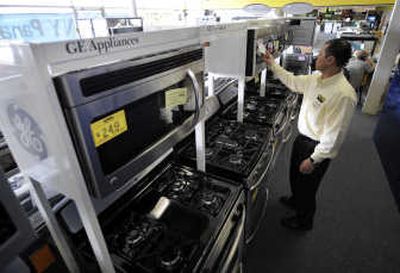GE lowers forecast on heels of unexpected slip in profits

Normally reliable General Electric Co. shocked investors with a nearly 6 percent decline in its first-quarter profit and slashed its earnings forecast for the full year. That sent its own shares down 10 percent and the broader market sharply lower on renewed worries about the weakening economy.
GE blamed disruptions in its financial business late in the quarter for its inability to advise Wall Street ahead of time about the deterioration in its earnings. But analysts unaccustomed to being surprised by the industrial, financial and media conglomerate were rattled by the magnitude of the decline.
GE’s financial services business fell 28 percent, driven by a 21 percent erosion in commercial finance due to lower real estate and other income. Net income fell 6 percent to $4.3 billion, or 43 cents per share, from $4.57 billion, or 44 cents per share, a year ago. Earnings from continuing operations came to $4.4 billion, or 44 cents per share, down 8 percent year-over-year.
That was well below the 51 cents a share expected by analysts surveyed by Thomson Financial for profit from continuing operations. The company had forecast a profit of 50 to 53 cents a share.
GE shares fell $4.46, or 12.1 percent, to $32.29 by midday. Wall Street’s major indexes were all down more than 1 percent after the report from a company that usually avoids surprising investors.
Just last month, Chief Executive Jeff Immelt had promised investors strong earnings despite the weakened U.S. economy, saying revenue and earnings would rise at least 10 percent this year.
In other earnings reports this week:
•Biotechnology giant Genentech Inc. is reporting a jump in its first-quarter profit of 12 percent compared to last year, but sales of its top-selling cancer drug disappointed Wall Street analysts.
For the quarter that ended March 31, the company earned $790 million, or 74 cents per share, compared with $706 million, or 66 cents a share, a year ago. Revenue was $3.06 billion in the quarter, an increase of 8 percent from $2.84 billion a year ago but missing analysts’ expectations by about $50 million.
•Rite Aid Corp., the nation’s third-biggest drugstore chain, reported Thursday that it lost $960.4 million in its fourth quarter, mostly the result of a non-cash income tax charge, as it worked to absorb more than 1,800 stores acquired last year.
The company said that it expects to lose money in fiscal 2009 for a third straight year and that sales would be below what analysts are predicting.
Rite Aid blamed a tough economy and spending to integrate the 1,850 Brooks and Eckerd stores it acquired in June in an effort to keep pace with its larger rivals, Walgreen Co. and CVS Caremark Corp.
•The crucial holiday-shopping season didn’t bring much cheer to Circuit City Stores Inc., but its cost-cutting efforts helped the struggling electronics retailer swing a profit for its fiscal fourth quarter.
The electronics retailer hadn’t seen a quarterly profit since the second quarter of 2007 and analysts had been expecting a loss for the December-February period.
Circuit City, facing pressure from an activist shareholder seeking improved profitability, said it earned $4.85 million, or 3 cents per share, in the three months ended Feb. 29 versus a loss of $4.25 million, or 3 cents per share, a year earlier.
•Levi Strauss & Co. began its new fiscal year with a 10th straight quarter of higher profits, but the jeans maker’s momentum appears to be tapering off as the U.S. economy frays.
The San Francisco-based company said Tuesday it earned $97.1 million during the three months that ended Feb. 24, a 12 percent improvement from net income of $86.6 million in the same period a year ago. Revenue rose 4 percent to $1.08 billion, primarily because of the weaker dollar and management’s decision to ship some clothing to retailers ahead of schedule.
•Alcoa Inc. reported its first-quarter profits sank by more than half as higher costs and a swooning U.S. dollar weighed down results, but executives said the company’s future is bright.
Alcoa President and Chief Operating Officer Klaus Kleinfeld said the company held a strong position in the aerospace market and expected to benefit from growing urbanization around the world as developing countries build infrastructure. With those trends, Alcoa sees aluminum consumption increasing about 6 percent annually over the next decade, he said.
Alcoa said it earned $303 million, or 37 cents per share, for the first three months of the year, compared with $662 million, or 75 cents per share, during the same period last year. Sales fell nearly 7 percent to $7.38 billion, from $7.91 billion a year earlier.